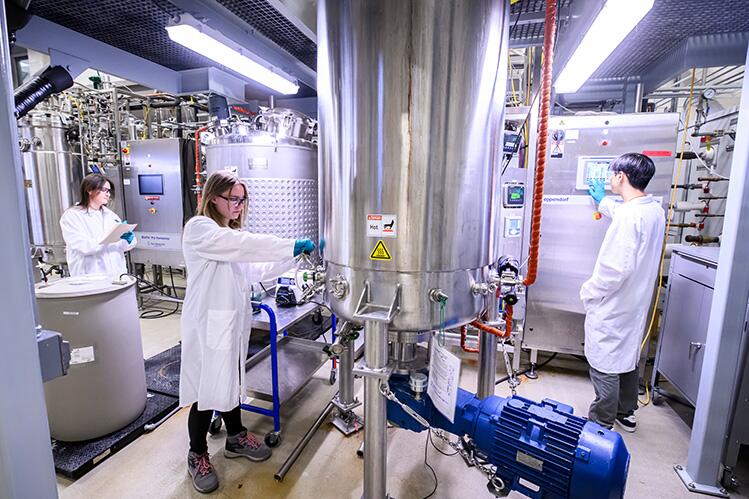The Integrated Bioprocessing Research Laboratory (IBRL) at the University of Illinois Urbana-Champaign and Research Park startup Boston Bioprocess (BBP) are part of the Illinois Fermentation and Agriculture Biomanufacturing Hub (iFAB), a newly designated Regional Innovation and Technology Hub fueling innovation and job creation in Central Illinois.
Co-located in Urbana-Champaign, IBRL and BBP are quickly becoming premier destinations for companies looking to leverage biomanufacturing to produce novel food ingredients, agricultural inputs, bio-materials, bio-aviation fuel, and more.
“IBRL and BBP provide complementary expertise and an ecosystem of resources to rapidly advance cutting-edge biomanufacturing and bioprocessing processes from the flask to industrial scale,” said iFAB Principal Investigator Beth Conerty, who is the associate director of business development at IBRL, part of the Department of Agricultural and Biological Engineering in the College of Agricultural, Consumer and Environmental Sciences (ACES) and The Grainger College of Engineering.
BBP oversees process development and finalizes parameters, preparing products to be scaled up at IBRL, said BBP cofounder and CEO Michael Tai. “BBP’s early-stage resources and experimental design expertise coupled with IBRL’s pilot-scale infrastructure helps clients smoothly transition from one end of the spectrum to the other,” Tai added. “We provide our clients with access to a suite of assets, talent, and expertise to navigate their scale-up journey.”
The two organizations are also committed to supporting iFAB’s workforce training goals to ensure the local expertise through trade programs and advanced degrees is available to realize these innovative fermentation technologies in Central Illinois.
IBRL has provided training to over 150 interns from U. of I. programs such as agricultural and biological engineering and food science. Upon graduation, these students transition to full-time roles at IBRL and across the industry, including many of IBRL’s 100+ industry clients.
“We’re working with some of the most cutting-edge synthetic biology companies out there, so students have direct access to venture capital-backed startups across all kinds of industries, host organisms, and products,” Conerty said. “In terms of learning and career opportunities, the multiplicity of jobs in the biomanufacturing sector is unparalleled.”
BBP has brought on three interns and a full-time employee from U. of I., creating additional opportunities for highly skilled graduates. “Our long-term plans for expansion and growth will result in more highly-skilled jobs locally,” Tai said. “IBRL and BBP’s partnership is establishing the region as a destination for biomanufacturing research, testing, and workforce development.”
Tai also brings expertise to the growing fermentation industry in Central Illinois. Previously, Tai managed production for multiple products at a scale of 500,000L+ at ADM, which is a key member of the iFAB consortium. As part of the strong partnership, Tai has shared his knowledge and insights running large-scale fermentation projects, including yeast, fungal, and bacterial strains, through the IBRL’s short courses for industry practitioners.
Both IBRL and BBP have benefited from expertise in the local Plumbers & Pipefitters Union (UA 149), which has been instrumental in developing and maintaining the infrastructure required for these emerging technologies. UA 149 recently established a new training facility that will help meet the demands of the expanding fermentation industry.
Contact iFAB Director Beth Conerty at bconerty@illinois.edu to discuss the myriad of opportunities supported by the iFAB Tech Hub, including bioprocessing pilot projects, workforce development, online programs, and more.
The Illinois Fermentation and Agriculture Biomanufacturing (iFAB) Tech Hub brings together a consortium of 30 partner organizations representing academic, industry, government, and nonprofit partners who are committed to catalyzing bioprocessing and precision fermentation industry growth in Champaign, Piatt, and Macon counties.

